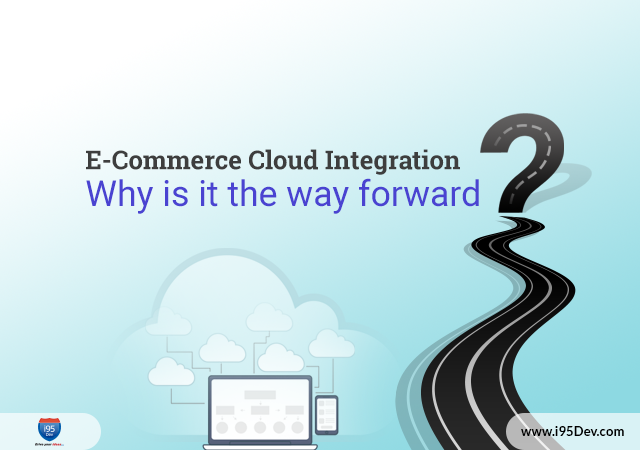eCommerce Cloud Integration
– Why is it the way forward?

In the multi-billion dollar eCommerce industry, the competition is cutthroat and companies are constantly nudging and elbowing to make it to the top by providing exceptional customer experience. The introduction of cloud in eCommerce has proved to be one of the largest technological boons for the industry as it improved operational efficiency largely and brought down ownership costs.
The idea of outsourcing services and storage seemed overwhelming and daunting in the beginning. But as the advantages of this technology eventually came into sight, the idea was lauded not only by e-commerce giants but by players across industries.
Here are the major advantages that the cloud has brought into the world of business:
Reduction of IT costs:
The costs incurred for the management and maintenance of IT systems in organizations are largely reduced. Utilizing the resources of the cloud service provider and not having to bear the expense of buying equipment and systems was where cost-cutting appeared. The four main factors of cost-cutting due to the cloud are:
- No longer do the needs of hiring expert IT staff and paying their wages
- The consumption of energy and other resources is decreased
- Resources in the form of regular system updates, software and hardware are no longer required
- Lesser number of time delays and bottlenecks
Scalability and flexibility of work practices:
The capital, resources and time saved can now be deployed in scaling up if the business and operations. Hence, the focal point then shifts from finding and hiring experts for the processes like data handling and operations to finding ways to scale up the business, revenues, and profits. The coping up about this scaling process will be taken care of by the service provider. However, during unforeseen circumstances, scaling down can also be done as per the need of the hour.
Simultaneously, companies can also leverage the existing infrastructure to work from anywhere. For the employees, the access to the virtual office becomes faster and easier to gain even on holidays, during a commute or from home at any hour, increasing potential multi-folds.
Business continuity and automatic updates:
Cloud computing architecture ensures that all the data is backed up, well-protected at a different private safe location, and is easily accessible. Conducting business becomes easier as there is minimal downtime ensured. The cost incurred towards these aspects is one of the key reasons for enabling business continuity. Generally, the cloud service providers ensure regular updates to your system, which is essential to compete with the technological advancements in the systems of your competitors.
Why cloud Integration in e-commerce operations
The cloud integration in eCommerce applications fetches all the aforementioned advantages and more. However, before plunging into the additional advantages, brushing-up the basics, briefly, would be an essential prerequisite.
Cloud integration refers to combining different systems into one integral whole system for them to work in a synchronous fashion. That makes seamless accessing and managing of data, applications, systems, and services possible through a one-stationed cloud computing architecture. As for the eCommerce applications, cloud integration’s deployment brings leads in terms of the business appearing virtually gigantic and operating extensively.
That said, the following are the multiple areas where eCommerce businesses obtain an edge over their competitors after gaining possession of a cloud computing architecture.
Go live in hours
Most integration platforms take weeks, if not months to be up and running. This is generally attributed to various factors like lack of coordination between the team, quality checks, and other technical aspects. In the case of a cloud connector, all you do is set up the connections and you are good to go. Many aspects like quality checks and other custom developments can be avoided. Cloud connectors are built to support specific platforms and are designed to perfection to function in a certain way. This will allow better predictability in functionality. The quick onboarding does not compromise this in any way.
Pay for what you use
Most companies differ the decision to procure a connector, as it is a substantial investment. Vendors are also unable to change this model with offline connectors, as they have to recover the cost incurred. Cloud connectors completely turn this over its head. Companies can pay for the number of API calls and features used. They are not paying for complete solutions. Hence, they can spread their costs. They can pay as they grow rather than investing a fortune on it. Additionally, companies sell their offline products as one. Very few companies offer to pay for the features what your use in offline products. However, in the case of cloud, almost all companies offer various levels of the same product with different prices based on what you pay.
While we just focused on two advantages here, there are a plethora of advantages that come with the cloud integration products. Cloud integration brings many advantages to the eCommerce business. It saves time and money when it comes to expenses on IT personnel and extensive data management and integration. The setups for infrastructure in itself may cost a fortune to any eCommerce giant. Cloud integration is a go-to solution for various needs of eCommerce businesses.
We provide cloud computing solutions and integration for e-commerce applications through the means of i95Dev’s NAV Cloud Connect. It is an all in one solution for the cloud computing and integration needs for the eCommerce businesses. Connect with us to know about it.




